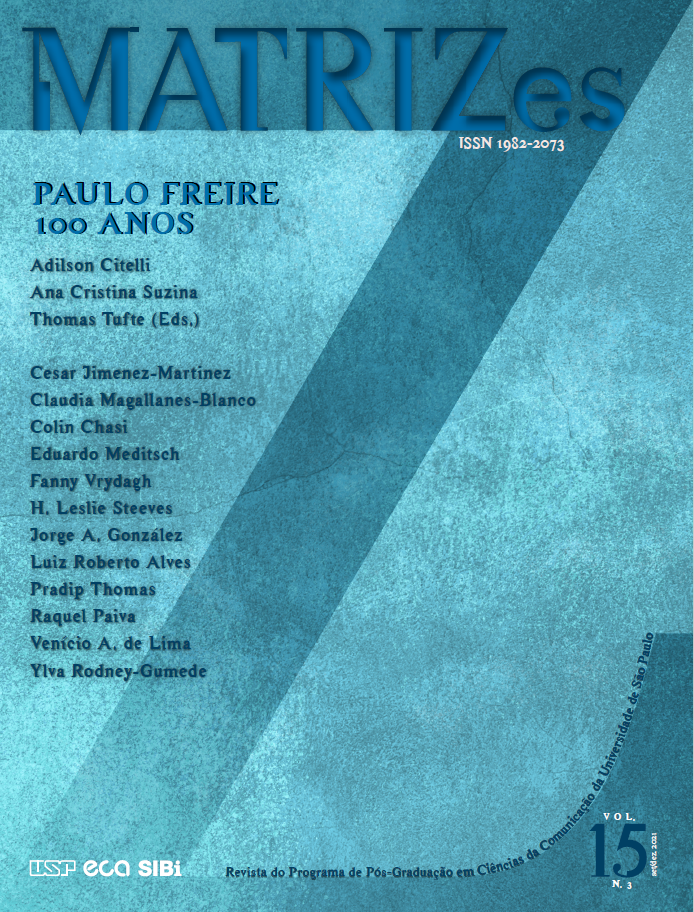Freire, comunicação e tolerância na Índia
DOI:
https://doi.org/10.11606/issn.1982-8160.v15i3p203-222Palavras-chave:
Freire, Teatro popular, Exclusão digital, Tagore, GandhiResumo
Este artigo explora a contínua relevância de Freire para a educação e a ação cultural na Índia. Aborda as especificidades das contribuições de Freire, revendo as obras dos principais pedagogogos indianos, Tagore e Gandhi. Trata, ainda, do pensamento freiriano na conjuntura específica da política indiana, caracterizada pelo hipernacionalismo. A partir das experiências do autor com a práxis do teatro popular, o artigo discute os desafios da educação crítica na Índia contemporânea, no contexto de uma pandemia que escancarou a falta de acesso à educação e a exclusão digital. O artigo reforça a necessidade de compreensão do contexto e de uma abordagem esclarecida para uma educação que promova a tolerância como contraponto ao hipernacionalismo.
Downloads
Referências
Banerjee, S. (2019). Indian people’s theatre association. In D. M. Figueira (Ed.), Art and resistance: Studies in Indian theatres (pp. 40-55). Peter Lang.
Basu, T. (2012). Caste matters: Rabindranath Tagore’s engagement with India’s ancient social hierarchies. South Asia: Journal of South Asia Studies, 35(1), 162-171. https://doi.org/10.1080/00856401.2011.648910
Brahma, J., Pavarala, V., & Belavadi, V. (2019). Driving social change through Forum Theatre: A study of Jana Sanskriti in West Bengal, India. Asia Pacific Media Educator, 29(2), 164-177. https://doi.org/10.1177/1326365X19864477
Chatterjee, J. (2016, 6 de fevereiro). The theatre of Badal Sircar. Fountainink. https://bit.ly/2WtgSpD
Coudray, S. (2017, 28 de janeiro), The Theatre of the Oppressed. Culture Matters. https://bit.ly/3DwI1cr
Covid meltdown exposes new front in India’s digital divide. (2021, 21 de abril). Al Jazeera. https://bit.ly/3Dk7wgW
Fonseca, C. (1973). Paulo Freire in Bombay. New Frontiers in Education, 3(2), 92-98.
Freire, P. (2005). Teachers as cultural workers: Letters to those who dare [Professora, sim; tia, não: Cartas a quem ousa ensinar]. Westview Press.
Freire, P. (2014a). Pedagogy of hope: Reliving pedagogy of the oppressed [Pedagogia da esperança]. Bloomsbury.
Freire, P. (2014b). Pedagogy of solidarity [Pedagogia da solidariedade]. In A. M. A. Freire & W. de Oliveira (Eds.), Pedagogy of solidarity:
Paulo Freire, patron of Brazilian education (pp. 15-33). Left Coast Press.
Ganguly, S. (2010). Jana Sanskriti: Fourm Theatre and democracy in India. Routledge.
Ghosh, R. (2019). Juxtaposing the educational ideas of Gandhi and Freire. In C. A. Torres (Ed.), The Wiley handbook of Paulo Freire (pp. 275-290). Wiley-Blackwell.
Ghosh, R., Naseem, M. A., & Vijh, A. (2011). Tagore and education: Gazing beyond the colonial cage. In A. A. Abidi (Ed.), Decolonising philosophies of education (pp. 59-71). Sense. https://doi.org/10.1007/978-94-6091-687-8
Gupta, A. (2021, 11 de janeiro). Pandemic is an opportunity to reimagine schools as places for community learning, The Indian Express. https://bit.ly/2WDGr7O
Jain, J. (2019). Badal Sircar’s journey towards the Third Theatre. In D. M. Figueira (Ed.), Art and resistance: Studies in Indian theatres (pp. 174-192). Peter Lang.
Jana, J. (2020, 6 de agosto). Bapu’s Nai Talim. The Statesman. https://bit.ly/3ylb5Qc
Jeyraj, J. J. (2021, 21 de abril). Critical pedagogy in emergency remote teaching: An open letter to Paulo Freire. ASCILITE Technology Enhanced Learning Blog. https://bit.ly/3zxtZVw
Jha, R., & Sanyal, S. (2019). Use of Theatre of the Oppressed in community development: A case study of Jana Sanskriti Ngo, West Bengal. Social Work Chronicle, 8(1), 105-112. https://bit.ly/3mTAEFY
Kidd, R. (1985). Popular theatre and nonformal education in the Third World: Five strands of experience. International Review of Education, 30, 265-287. https://doi.org/10.1007/BF00597905
Mandal. S. (2019). The rise of lifelong learning and the fall of adult education in India. London Review of Education, 17(3), 318-330. http://doi.org/10.18546/LRE.17.3.08
Mevawala, Z. (2020). Critical consciousness, social justice and resistance: The experiences of young children living in the streets in India. Peter Lang.
Nath, S. (2012, 9 de julho), Who’s afraid of Augusto Boal. The Indian Express. https://bit.ly/3Btuqka
Pandey, K. (2020, 30 de julho). Covid 19 lockdown highlights India’s great digital divide. Down to Earth. https://bit.ly/38kPxso
Siddartha. (s.d.). Beyond Paulo Freire. https://bit.ly/3mzcQHk
Thakur, P. B. (2013). Theatre for development in Indian context: An introspection. Global Media Journal – Indian Edition, 4(2), 1-12. https://bit.ly/38qnlod
Thomas, P. N. (1987). Communication and development in India: A study of two approaches [Tese de doutorado, University of Leicester]. Repositório da University of Leicester. https://bit.ly/3nqlBUq
Thomas, P. N. (1995). Popular theatre in sickness and in health: Observations from India, In J. Servaes, T. L. Jacobson, & S. A. White (Eds.), Participatory communication for social change (pp. 213-222). Sage.
Waisbord, S. (2020). Why Paulo Freire is a threat for right-wing populism: Lessons for communication of hope. The International Communications Gazette, 82(5), 440-455. https://doi.org/10.1177/1748048520943694
Woods, A. (2020, 2 de julho). Why is the Brazilian right afraid of Paulo Freire. Open Democracy. https://bit.ly/3DvrjKG
Downloads
Publicado
Edição
Seção
Licença

Este trabalho está licenciado sob uma licença Creative Commons Attribution-NonCommercial-ShareAlike 4.0 International License.
Autores que publicam nesta revista concordam com os seguintes termos:
- Autores mantêm os direitos autorais e concedem à revista o direito de primeira publicação, com o trabalho simultaneamente licenciado sob a Licença Creative Commons Attribution (CC BY-NC-SA 4.0) que permite o compartilhamento do trabalho com reconhecimento da autoria e publicação inicial nesta revista para fins não comerciais.
- Autores têm autorização para assumir contratos adicionais separadamente, para distribuição não-exclusiva da versão do trabalho publicada nesta revista (ex.: publicar em repositório institucional ou como capítulo de livro), com reconhecimento de autoria e publicação inicial nesta revista.























